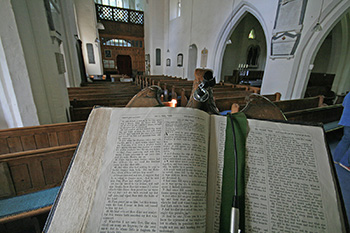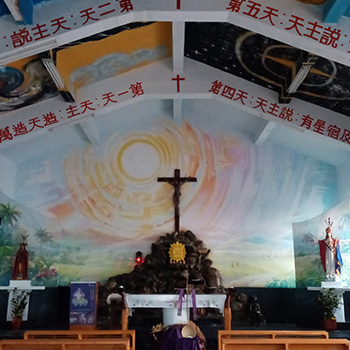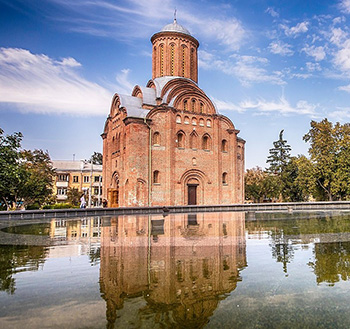Michael Fitzpatrick is a parishioner at St. Mark's Episcopal Church in Palo Alto, CA. After growing up in the rural northwest, he served over five years in the U. S. Army as a Chaplain's Assistant, including two deployments to Iraq. After completing his military service, Michael has done graduate work in literature and philosophy. He is now finishing his PhD at Stanford University.
Every few months it seems like another social survey is released bearing statistics that point to a deepening decline in church attendance. While certain Western denominations take this as an opportunity to judge other denominations, the reality is that church attrition is affecting every single Christian sect and community, and even other religious traditions. In tandem with these trends has been the increase of the so-called “nones” — that is, people who have no religious identity at all.
For many of us, especially parish priests and pastors, the whole business is a source of great anxiety. Those of us who have devoted our lives to the service of the Church really hate to see decline in something we love and in which we have invested so much. Perhaps we resolve to work even harder, to stave off the inevitable collapse just a few decades longer.
How should we navigate this anxiety? How do we advocate for our parishes and denominations and traditions in a way that is Christ-filled and not our own attempts to assume control of the situation? Too often we are tempted to think of the Church as something we create, sustain, and are wholly responsible for. But what if these silent assumptions aren’t true? What if in our fear over cultural change we’ve lost sight of what the Church is?
 |
|
St. Mary's Parish in East Knoyle, Wiltshire, UK.
|
I am as fearful as any. To navigate these questions in my own soul, I’ve been reading a marvelous little essay on the Church by Karl Barth in his book God Here and Now. He was one of the pastors in Germany who helped form the "Confessing Church" to protest the Nazi party. Barth tackles three questions: What is the Church? What is the threat to the Church? And from where can we hope for renewal in the Church?
From the outset, Barth disabuses us of any illusions we may have: The Church exists as one of the mighty acts of our Creator. He writes, “The fellowship of the Holy Spirit is the act proceeding from the very heart of God, in the accomplishment of which it becomes true that certain [people] in the midst of this world know that which is effective for the whole world but is not yet known to be effective by the rest of the world, which in fact the rest of the world has to be informed of by these [people]: that Jesus Christ is the Lord.”
Church is not something we have achieved through our good business sense or our divinity degrees or our hard work. Just as salvation comes by grace, so does the Church. We gather together to baptize and break bread because Christ himself has called us to be together in worship of the triune God and in service to one another. If Christ had not called us, we would not be the Church in the first place.
Though the Church is a gift of our Redeemer and not something we have accomplished, this doesn’t mean we bear no responsibility for the health and well-being of the Church. In his second section, Barth explores the threat to the Church. He treats the Church as a divine and human integration; while Christ as Head of the Church will always be faithful, we as the Body of Christ may not be. One way the Church is threatened is when we know our liturgies, creeds, and prayers, but we no longer hear these as words addressed to us, to our “own lives, in dialogue with the needs and tasks of the present world, as if [we] had heard [these words] for the first time.” A person may be utterly ready to defend the faith, slow the creeping tide of apostasy, stand up for the divine moral law, and yet “all that remains of the congregation’s expectation of, and hurrying toward, His coming is the activity of a worthy museum keeper and the to-and-fro of a few happenstance-interested museum visitors!”
 |
|
Paiwan Catholic Parish in Tjimur, Taiwan.
|
Is that us? Are we people who serve our parishes and dioceses to keep the lights on and the old ways going, unwilling to face the reality that our faith no longer moves other people towards Christ, and perhaps doesn’t even move us? Do we have the courage to recognize the possibility that people become “nones” because we are not witnesses to anything else?
Barth describes several other threats, but I want to highlight his last example — a church that has become “the apparent Church.” It’s here that he alludes most directly to Germany under the Third Reich, during which the Nazi regime sought to colonize the national parishes to support their rule. Barth, along with Dietrich Bonhoeffer and a contingent of Protestant pastors, led the Confessing Church resistance against the Nazification of the Church, culminating in his expulsion from the country in 1935. It was Barth’s contention that, when churches took the oath to Hitler, they had ceased to be the Church. Not that this would be evident in social disapproval, since
the Church in which the confrontation of God with men and of men with God is no longer an event, but only an institution, dogma, program, and problem, can fall on especially good days in this age and may enjoy the special respect of society and the state.
A parish or network of churches can be flourishing, growing in numbers, becoming affluent, winning the affection of society, and yet not be animated by the living Christ. If we set up worldly values as superior to the Lordship of Christ, we have dethroned our Redeemer as the true judge of this world and its values. The only way we can be authentically the Church is with Christ as our Head, in oath and conformity to nothing else. Are we willing to face the possibility that we have a great coffee hour and a wonderful choir and we vote the right way, but we have lost the “uninterrupted current of [our] connection with the living Lord?” That our parishes in decline are no longer a fellowship of the Holy Spirit, but only fraternal spirit?
 |
|
St. Paraskevi of Serbia Cathedral in Chernivtsi, Ukraine.
|
I pass no judgment on anyone or any parish community. Indeed, this is properly a judgment each parish and Christian should ask of themselves. Am I doing church because I have been called and animated by the love of God displayed in Christ? Or am I doing church because it makes me feel superior to others, or because this particular congregation confirms my biases in their words and sermons? Some churches have been taken over by rampant chauvinism, which is not love at all. They have supported state-sponsored oppression and imperial expansion. Other churches have become enamored by a worldly, superficial sort of love. Yet Barth insists that “Love which does not burn in this connection, love which would seek another, more comfortable unity than that which has been lost and is to be found in Jesus Christ Himself, would not be Christian love, nor would it create unity.” Our sole hope is the love of God in Christ, and all other forms of love and social action must be anchored therein.
What then are we to do? If we live in the threat of becoming parishes whose practice is no longer sustained by our living Lord, how are we to hope in the renewal of the Church, as we watch our numbers dwindle? Barth responds,
If the Church is preserved, if in spite of all it has continuance in time, then that must mean that it experiences anew, again and again, the same thing which it experienced in coming into existence, an eternally new reformation which corresponds to its formation… Preservation, and therefore renewal, and therefore reformation of the Church, however, can come only from its living Lord. The congregation threatened with death can be protected from death only by Him. The congregation which is already dead can be awakened from the dead to new life and be rescued only by Him. The hope and the only hope of the Church is that He so speak His Word that the corresponding answer is found among Christians, that He accept and make use of the witness of His apostles once again, that He make the exposition and application of this witness strong, deep, and contemporary in laying hold of men, both for the Christians themselves and also for the world, that He operate as Lord of the covenant of baptism, that in the Lord’s Supper He come and be our guest, that what He has given us be blessed. No sure hope can be placed in good will, religious sincerity, or in Christian ideals. All this is exposed to temptation and already fallen. All this is the completely human realm of the Church and needs renewal. It can never be the source of its own renewal. He, Jesus Christ, who stands under no threat and needs no renewal, He, the Lord, is the hope of the Church.
If our good will and our sincerity will not save our churches, it’s because only Christ can do that. Our response needs to be an openness to allowing the Resurrected One to resurrect us. We need to be on our knees at each daily office, Eucharist, and parish gathering calling on the One who is the way, the truth, and the life, to raise our congregations into the resurrection life. If we are in communion with Jesus, it does not matter what our numbers are, for we are the Church he has called us to be. What matters is not our Sunday attendance. What matters is whether someone searching for the beating heart of God will find it in our midst.
Michael Fitzpatrick welcomes comments and questions via m.c.fitzpatrick@outlook.com



